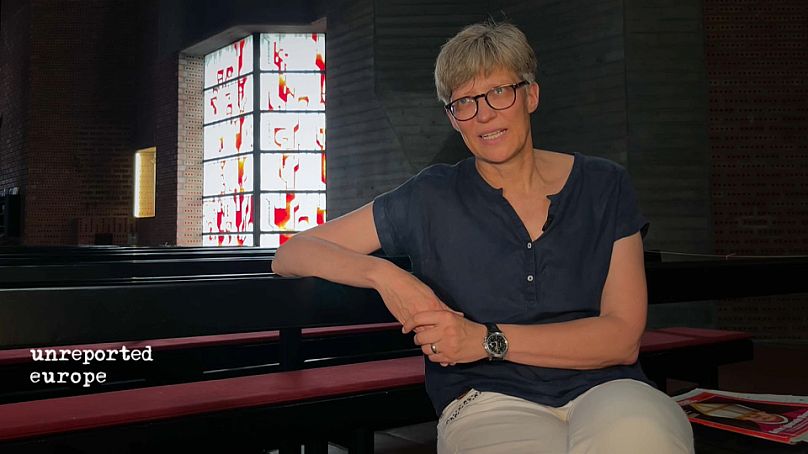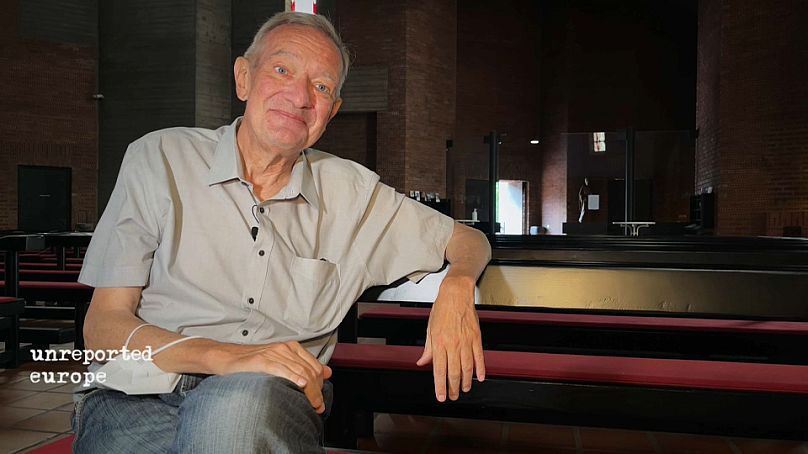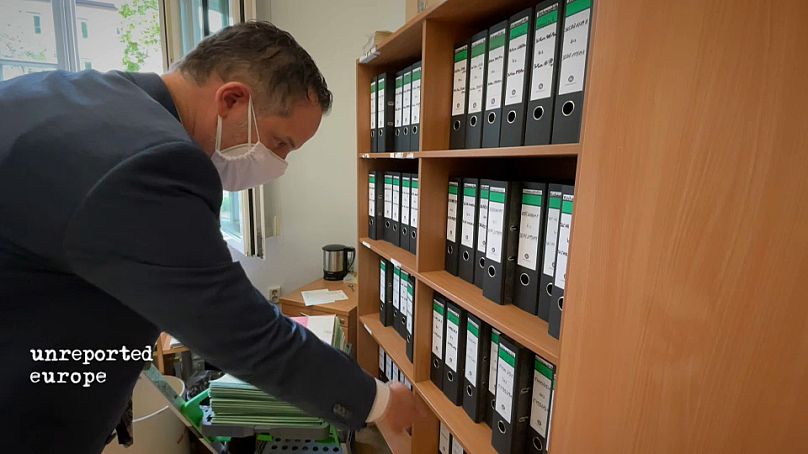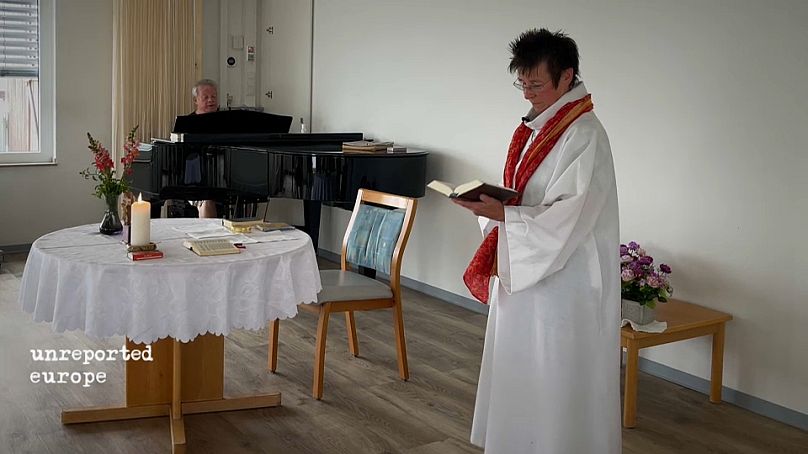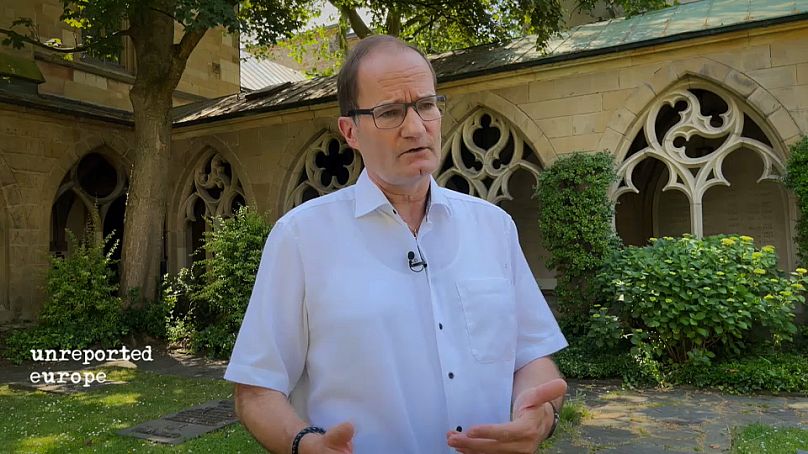On the back of resounding paedophilia scandals, the German Catholic church is going through a revolution that is unprecedented in Europe. This revolution started in Cologne in Germany. People concerned there give their insight into how things are unfolding.
In a quiet area of the city of Cologne in western Germany, rainbow banners stand proudly in front of St Pankratius Church.
 ADVERTISEMENT
ADVERTISEMENT
 ADVERTISEMENT
ADVERTISEMENT
St Pankratius is one of roughly one hundred churches across Germany that organised public blessings of same-sex couples on a day called, "Love wins" last May.
Love Wins
Karin and her wife, Britta, were blessed there. Karin tells us that she has been with her partner for over 20 years. They had a civil marriage in 2020. In 2008, when they registered their civil partnership, they had received a secret blessing from a Catholic priest who was suspended at the time.
To Karin, the public blessing was a long-awaited recognition. "Faith is very important to me and my wife", she says "it moved us deeply to no longer have this secret".
"It was simply a great joy, and a great step away from the Rome that has discriminated against us and rejected us so much and refused to let us be blessed.”
A Progressive Priest
Wolfgang Fey is the Senior Priest at St Pankratius Church. He was the one who authorised these blessings in May. He tells us about his motivation for doing so and comments that when he was a child, "there was a father, a mother and a child. That was a family".
But he stresses that things are very different now as there are same-sex couples with children, single parents and blended families. He believes that priests "must be alert to what is happening and aware of how people live". He adds that "blessings are at the heart of life and pastors, priests are among people, and must understand the way they live today".
In defiance of Vatican doctrine, the blessing of homosexual unions is just one of the expressions of a growing reform movement in Germany. Discontent is also largely fuelled by paedophilia scandals.
Scandals causing defection
One such scandal involves the Archbishop of Cologne, Cardinal Woelki. He has been under fire for having delayed the publication of an 800-page report on sexual abuse of minors by members of his diocese. He is even accused of covering up abusers. It's a major factor to indignation among German Catholics being at an all-time high.
In Cologne’s district court is an office where dozens of people come every day to officially leave the Catholic church. The demand to leave the Catholic Church is so high, that the registration server at a dedicated State judicial administration broke down once. Appointments increased from 600 to 1800 a month, says the Tribunal spokesperson.
The Cost of Religion
Followers of all faiths in Germany are required to pay a tax to finance the religious institutions they belong to. This is registered by tax authorities.
With people feeling unrepresented in the Catholic Church and frustrated by the way its authorities handle the abuse scandals, more and more catholics no longer want to finance the institution. We met Christina at the deregistration office. She is one of the people outraged by what is going on. She tells us that the Catholic Church is no longer acceptable to her, that's why she's there.
We also meet Doris who served in the Catholic Church for many years. She left the institution a year ago. She continues to work within the Christian community with a movement called Maria 2.0 which advocates thorough reform of religious institutions.
She informs us that Maria 2.0 essentially wants to "address the causes of sexual violence and to stop its perpetrators from holding office". Some of the other changes it advocates are:
- Women to be allowed access to all of the church's responsibilities.
- Compulsory celibacy to be lifted so that everyone has a choice.
- Attitudes towards sexual morality to change to fit current society.
Doris considers the latter to "ostracizing and inhuman".
In the light of growing discontent within its institutions, the bishops’ conference and the central committee of German Catholics are exploring ways to reform the church. In 2019, they launched a vast debate referred to as the 'Synodal Path'. Their conclusions are due in 2022.
A More Active Role for Women
Marianne Arndt is actively involved in the ‘Synodal Path’. We meet her at a retirement home where she preaches every month in Cologne. It's something women are currently allowed to do only after a priest has given the sacraments.
The pensioners at the care home say this rule is absurd and unfair. Mathias, one of the people living there, tells us that "man is both man and woman. This is how God created us, in his image". He doesn't think it's right that part of humanity should be excluded from spreading the word of God.
Last May, Marianne took part in the “Women Preachers’ Day” when masses were held by women in a dozen churches across Germany. The goal was to demand equal rights for women in the church.
To Marianne, empowering women would influence peace in the world:
"In the Middle Ages, the Catholic Church made it possible for girls to write, to be educated. Today it must enable women to have equal rights in their institution so that women worldwide can have equal rights, the same duties, equal responsibilities and thus change the world."
Pushing for reform
The wind of change is blowing in part of the German Catholic Church's hierarchy. The diocese of Essen, which is part of the ecclesiastical province of Cologne, is among those pushing for reform.
According to the diocese's deputy bishop, Klaus Pfeffer, defection among followers and a drop in vocational calling will continue, unless something is done.
He is aware that unrest and dissatisfaction in the innermost core of the Catholic Church are enormous, regardless of the abuse scandal. He also acknowledges the issue of equal rights for women and how hurtful it is for same-sex couples to be told that they are living in sin.
That's why they're campaigning for change, for reform and also for more plurality in the Church, for more openness, to stop more and more people leaving. Only the future can tell whether these reforms will come to fruition.











